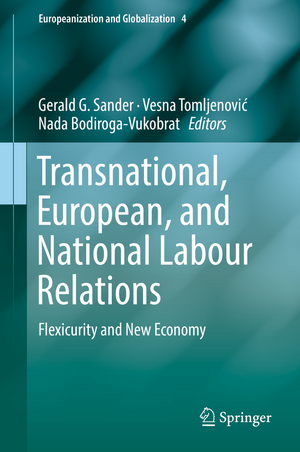Transnational, European, and National Labour Relations: Flexicurity and New Economy: Europeanization and Globalization, cartea 4
Editat de Gerald G. Sander, Vesna Tomljenović, Nada Bodiroga-Vukobraten Limba Engleză Hardback – 9 iul 2018
Taking these ideas as a starting point, the book presents a collection of research on various aspects and implications of changing labour relations in the EU Member States. The opening chapters address the internal market dimension of the transformation of employment relations by investigating how social dumping, integration of migrant workers, and cross-border mergers influence national labour policies and laws. The book further analyses linguistic and terminological challenges in the field of labour law in the EU’s multi-lingual legal environment. Subsequent chapters cover various theoretical and practical issues, such as the impact of chain-liability regulatory models on the legal situation of workers in subcontracting networks, and modern work arrangements in the collaborative or ‘gig’ economy. Other chapters are dedicated to issues of jurisdiction and law applicable to individual employment contracts, as well as alternative resolution mechanisms in labour disputes. The next section offers fresh insights on and a critical overview of the well-known Danish and Dutch models of flexicurity, often cited as role models for reforms of labour markets in other EU Member States. Three individual chapters investigate specific aspects of flexicurity in Croatia, in terms of individual dismissals, life-long learning and the impact of non-standard employment on future pension entitlements. One paper explores temporary agency work in Germany as an important instrument of flexicurity, while another discusses various forms of work used in Slovenia in the context of flexibilization of work relations. Many challenges still lie ahead, and the primary aim of this book is to provide a solid basis for informed future discussions.
| Toate formatele și edițiile | Preț | Express |
|---|---|---|
| Paperback (1) | 728.74 lei 6-8 săpt. | |
| Springer International Publishing – 10 dec 2019 | 728.74 lei 6-8 săpt. | |
| Hardback (1) | 1007.17 lei 6-8 săpt. | |
| Springer International Publishing – 9 iul 2018 | 1007.17 lei 6-8 săpt. |
Preț: 1007.17 lei
Preț vechi: 1228.26 lei
-18% Nou
Puncte Express: 1511
Preț estimativ în valută:
192.77€ • 200.49$ • 161.54£
192.77€ • 200.49$ • 161.54£
Carte tipărită la comandă
Livrare economică 13-27 martie
Preluare comenzi: 021 569.72.76
Specificații
ISBN-13: 9783319022185
ISBN-10: 3319022180
Pagini: 250
Ilustrații: X, 327 p. 5 illus., 4 illus. in color.
Dimensiuni: 155 x 235 x 28 mm
Greutate: 0.65 kg
Ediția:1st ed. 2018
Editura: Springer International Publishing
Colecția Springer
Seria Europeanization and Globalization
Locul publicării:Cham, Switzerland
ISBN-10: 3319022180
Pagini: 250
Ilustrații: X, 327 p. 5 illus., 4 illus. in color.
Dimensiuni: 155 x 235 x 28 mm
Greutate: 0.65 kg
Ediția:1st ed. 2018
Editura: Springer International Publishing
Colecția Springer
Seria Europeanization and Globalization
Locul publicării:Cham, Switzerland
Public țintă
ResearchCuprins
Transformation of Employment Relations and Social Dumping in the European Union - the Struggle between David and Goliath? by Mario Vinković.- Cross-Border Mobility, Supranational Companies and Employee Participation – no Chance for Harmonization by Hana Horak.- Immigration and labour policies: paradoxes of the European Union by Laura Calafà.- Making a Living in the ‘Gig’ Economy: Last Resort or a Reliable Alternative? by Nada Bodiroga-Vukobrat, Ana Pošćić and Adrijana Martinović.- Law Applicable to Employment Contracts under the Rome I Regulation by Ivana Kunda.- Coping with Vague EU Legal Concepts by Martina Bajčić.- International Jurisdiction over Individual Contracts of Employment by Aleš Galič.- Liability models in supply chains - the flow of an innovative regulatory idea in a global legal space by Attila Kun.- Functional Flexibility in the Context of Lifelong Learning by Andrijana Bilić.- Danish Flexicurity –Not the Same Today as Yesterday by Herman Knudsen and Jens Lind.- Dilemmas in Organizing the Labour Market; Experiences with Flexicurity in the Netherlands by Frans Pennings.- Temporary Agency Work in Germany – A Short History and the Situation de lege lata by Mijo Božić and Gerald G. Sander.- Flexible and New Forms of Employment in Croatia and their Pension Entitlement Aspects by Ivana Grgurev and Ivana Vukorepa.- Individual Dismissal in Croatia by Sandra Laleta.- ADR in Labour Law Disputes in Italy by Gina Gioia.- Forms of Work Performed in the Republic of Slovenia by Darja Senčur Peček.
Textul de pe ultima copertă
This book employs an innovative approach to explore the topic of flexicurity and related changes in the working world, the importance of which for the overall economic and social development is gradually being recognised. It focuses on the changing nature of work and its impact on EU law and national labour and social security laws. Though the transformation of regulatory and institutional frameworks of labour relations follows different patterns in different EU Member States, it is nevertheless a common phenomenon that offers an excellent opportunity for mutual learning experiences and comparing notes on best practices.
Taking these ideas as a starting point, the book presents a collection of research on various aspects and implications of changing labour relations in the EU Member States. The opening chapters address the internal market dimension of the transformation of employment relations by investigating how social dumping, integration of migrant workers, and cross-border mergers influence national labour policies and laws. The book further analyses linguistic and terminological challenges in the field of labour law in the EU’s multi-lingual legal environment. Subsequent chapters cover various theoretical and practical issues, such as the impact of chain-liability regulatory models on the legal situation of workers in subcontracting networks, and modern work arrangements in the collaborative or ‘gig’ economy. Other chapters are dedicated to issues of jurisdiction and law applicable to individual employment contracts, as well as alternative resolution mechanisms in labour disputes. The next section offers fresh insights on and a critical overview of the well-known Danish and Dutch models of flexicurity, often cited as role models for reforms of labour markets in other EU Member States. Three individual chapters investigate specific aspects of flexicurity in Croatia, in terms of individual dismissals, life-long learning and the impact of non-standardemployment on future pension entitlements. One paper explores temporary agency work in Germany as an important instrument of flexicurity, while another discusses various forms of work used in Slovenia in the context of flexibilization of work relations. Many challenges still lie ahead, and the primary aim of this book is to provide a solid basis for informed future discussions.
Taking these ideas as a starting point, the book presents a collection of research on various aspects and implications of changing labour relations in the EU Member States. The opening chapters address the internal market dimension of the transformation of employment relations by investigating how social dumping, integration of migrant workers, and cross-border mergers influence national labour policies and laws. The book further analyses linguistic and terminological challenges in the field of labour law in the EU’s multi-lingual legal environment. Subsequent chapters cover various theoretical and practical issues, such as the impact of chain-liability regulatory models on the legal situation of workers in subcontracting networks, and modern work arrangements in the collaborative or ‘gig’ economy. Other chapters are dedicated to issues of jurisdiction and law applicable to individual employment contracts, as well as alternative resolution mechanisms in labour disputes. The next section offers fresh insights on and a critical overview of the well-known Danish and Dutch models of flexicurity, often cited as role models for reforms of labour markets in other EU Member States. Three individual chapters investigate specific aspects of flexicurity in Croatia, in terms of individual dismissals, life-long learning and the impact of non-standardemployment on future pension entitlements. One paper explores temporary agency work in Germany as an important instrument of flexicurity, while another discusses various forms of work used in Slovenia in the context of flexibilization of work relations. Many challenges still lie ahead, and the primary aim of this book is to provide a solid basis for informed future discussions.
Caracteristici
Analyzes the transformation of employment relations in the 'gig' economy Offers fresh insights into flexicurity in the digital world Offers comparative overview of flexibilisation of labour relations in different Member States


















